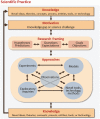Conceptions of Good Science in Our Data-Rich World
- PMID: 29599533
- PMCID: PMC5862324
- DOI: 10.1093/biosci/biw115
Conceptions of Good Science in Our Data-Rich World
Abstract
Scientists have been debating for centuries the nature of proper scientific methods. Currently, criticisms being thrown at data-intensive science are reinvigorating these debates. However, many of these criticisms represent long-standing conflicts over the role of hypothesis testing in science and not just a dispute about the amount of data used. Here, we show that an iterative account of scientific methods developed by historians and philosophers of science can help make sense of data-intensive scientific practices and suggest more effective ways to evaluate this research. We use case studies of Darwin's research on evolution by natural selection and modern-day research on macrosystems ecology to illustrate this account of scientific methods and the innovative approaches to scientific evaluation that it encourages. We point out recent changes in the spheres of science funding, publishing, and education that reflect this richer account of scientific practice, and we propose additional reforms.
Keywords: data-intensive science; hypothesis testing; iteration; science education; science funding.
Figures




Similar articles
-
Darwin's artificial selection as an experiment.Stud Hist Philos Biol Biomed Sci. 2006 Mar;37(1):26-40. doi: 10.1016/j.shpsc.2005.12.002. Epub 2006 Jan 24. Stud Hist Philos Biol Biomed Sci. 2006. PMID: 16473266
-
Should the History of Science Be Rated X?: The way scientists behave (according to historians) might not be a good model for students.Science. 1974 Mar 22;183(4130):1164-72. doi: 10.1126/science.183.4130.1164. Science. 1974. PMID: 17789214
-
Conflicts of interest in medical science: peer usage, peer review and 'CoI consultancy'.Med Hypotheses. 2004;63(2):181-6. doi: 10.1016/j.mehy.2004.06.001. Med Hypotheses. 2004. PMID: 15236772
-
The science of research: the principles underlying the discovery of cognitive and other biological mechanisms.J Physiol Paris. 2007 Jul-Nov;101(4-6):203-13. doi: 10.1016/j.jphysparis.2007.11.002. Epub 2008 Jan 8. J Physiol Paris. 2007. PMID: 18280120 Review.
-
The influence of "new science" on dental education: current concepts, trends, and models for the future.J Dent Educ. 2007 Apr;71(4):450-62. J Dent Educ. 2007. PMID: 17468305 Review.
Cited by
-
Poor hypotheses and research waste in biology: learning from a theory crisis in psychology.BMC Biol. 2025 Feb 4;23(1):33. doi: 10.1186/s12915-025-02134-w. BMC Biol. 2025. PMID: 39901226 Free PMC article. Review.
-
Sex differences in the human brain: a roadmap for more careful analysis and interpretation of a biological reality.Biol Sex Differ. 2022 Jul 26;13(1):43. doi: 10.1186/s13293-022-00448-w. Biol Sex Differ. 2022. PMID: 35883159 Free PMC article.
-
The Importance of Childhood for Adult Health and Development-Study Protocol of the Zurich Longitudinal Studies.Front Hum Neurosci. 2021 Jan 28;14:612453. doi: 10.3389/fnhum.2020.612453. eCollection 2020. Front Hum Neurosci. 2021. PMID: 33633550 Free PMC article.
-
The liver matrisome - looking beyond collagens.JHEP Rep. 2020 Apr 18;2(4):100115. doi: 10.1016/j.jhepr.2020.100115. eCollection 2020 Aug. JHEP Rep. 2020. PMID: 32637906 Free PMC article. Review.
-
The challenges of big data biology.Elife. 2019 Apr 5;8:e47381. doi: 10.7554/eLife.47381. Elife. 2019. PMID: 30950793 Free PMC article.
References
-
- Baird D. University of California Press; 2004. Thing Knowledge: A Philosophy of Scientific Instruments.
-
- Baraniuk RG. More is less: Signal processing and the data deluge. Science. 2011;331:717–719. - PubMed
-
- Bell G, Hey T, Szalay A. Beyond the data deluge. Science. 2009;323:1297–1298. - PubMed
-
- Bellon R. Darwin's evolutionary botany. In: Ruse M, editor. The Cambridge Encyclopedia of Darwin and Evolutionary Thought. Cambridge University Press; 2013. pp. 131–138.
LinkOut - more resources
Full Text Sources
Other Literature Sources

